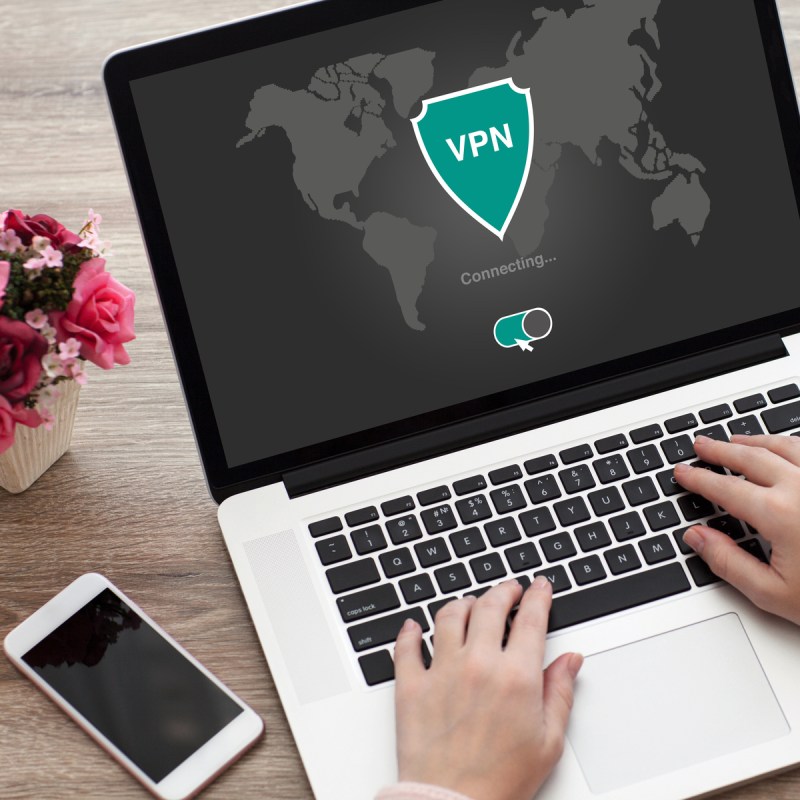
(Photo Credit: DenPhotos / Shutterstock.com)
One of the thoughts on your mind about traveling full time may be concerns about safety. Clearly, anytime we travel, this will be on our mind. But, when travel becomes your life, instead of a vacation, you aren’t returning home for an indefinite period. This means that, if things get stolen or you find yourself feeling unsafe, you won’t be running back home to replenish or take a breath. That’s why keeping yourself, and your belongings, safe can take on a more significant role as you travel.
Videos by TravelAwaits
I’ve been solo traveling the world since 2018, so I’ve learned a thing or two about traveling safely. Here are nine tips to stay safe as you travel the world.
1. Invest In A VPN
One of the things you’ll need to protect is your money. While you’re at home, you probably don’t think twice about logging into your online bank account to see how much money is in your checking account, or to move money around. When you travel, especially if you’re using Wi-Fi, every time you conduct a financial transaction, such as logging into your bank account or using your credit card to purchase something, you open yourself up to your money being stolen, or your credit cards being hacked.
The solution is to get a Virtual Private Network (VPN). What this does is mask your internet connection from would-be hackers, making it much harder to compromise your accounts. To get one, you simply invest in software, install it on your laptop and your phone, and make sure it’s on at any time you perform financial transactions.
I use Cyberghost, but Tunnelbear is another popular resource. The only time I had a credit card compromised, since starting my travels in 2018, is the one time I couldn’t connect to my VPN and bought a train ticket online without it. It was compromised instantly, and I’ve never done a financial transaction again without my VPN.
Pro Tip: While in slow Wi-Fi, it may be difficult to connect to your VPN. Wait until you get to better Wi-Fi instead of making a purchase without protecting your internet connection.
2. Double Up On Credit Cards
Unfortunately, you might have a card compromised. The one time I had my card details stolen, I was in Namibia. The internet and cell phone signal were so bad that I could barely get a call out to American Express to report the fraud. It also turns out, when you’re moving around a lot, it’s difficult to get a replacement card mailed to you, and there are limitations on places that are acceptable to receive it. Fortunately, I was able to take up residency, with my Marriott points, at a Marriott hotel outside Johannesburg where I could receive my card. The process, however, was painful, required daily check-up phone calls, mishaps, and was a general pain-in-the-patooty.
It’s for this reason that I’ve learned to travel with at least two credit cards and place them in separate wallets. This way, if one card gets compromised, I’m not left without access to credit. Always store your cards and cash in separate places so that if someone makes off with something, they don’t take everything at once. I strongly recommend you don’t use any credit cards tied to your bank account. If those get compromised, you may be cut off from access to cash for an extended period of time.
3. Use Your Phone Wallet
If you have an iPhone, you can add your credit cards to your Apple Wallet. I love this feature because every time a charge is made on any card in my wallet, I get an immediate notification. This allows me to report fraud quickly, get the charges removed, and not worry about being liable for tons of money that could squander my travel budget. Another reason to do this is, if you run into replacement card difficulties while on the road, your wallet updates with your new card number much faster than the card gets to you, so you can begin using it quicker.
4. Be Mindful Of Scams
I’ve found the process of adapting to a new city intriguing. When I arrive, I stick out like a sore thumb and am clearly identifiable as a tourist. After about a week, I feel more at home. Once that settling in happens, I become less of a target for scammers, a welcome relief.
In those first few days in a new country, or new city, however, take the time to learn any known tourist scams. For instance, in Chile, I was traveling by bus and was warned that people sometimes dress like an employee of a specific bus company. I met a lovely English couple in their 20s while I was in Santiago. They got taken advantage of by one of these fake employees who offered to put their bags on top of the bus, and they had given him their bag with their passports.
Pro Tip: Never separate yourself from your passport if given the choice.
5. Inquire About And Avoid Dangerous Areas
The first thing I do when I check into a new place is ask whether there are any parts of town known to be dangerous. Whatever advice I get, I listen. In Cape Town, I asked for directions to walk from my hotel in Greenmarket Square over to the V&A Waterfront. The staff member I spoke to replied, “You don’t walk, you get a taxi.” I found this ridiculous because it was early in the morning, but did as instructed.
A couple of days later, I walked a few blocks from the hotel towards the waterfront. Within three blocks, I could feel the neighborhood change. I noticed a man looking me up and down assessing whether I had anything of value. I returned to my hotel immediately and never questioned their advice again.
6. Consider A Taxi When Going To Or From The Airport
Luggage is a clear sign to people that you may not be a local. If you’re a full-time traveler, you should have less luggage than the average tourist. However, in many cities, especially after the pandemic has ravaged economies, using public transportation with a suitcase or large backpack could make you a target for theft. Remove the travel tags from your bags so it’s less easy to figure out where you’ve flown in from, unless it’s within the same country. Instead of taking a subway to your lodging, consider a taxi. While it can be expensive, it’s a worthwhile expense to avoid the danger of being pickpocketed, which may cost you more than the taxi depending on how much cash you have on you.
7. Register With Your Government’s Safety Program
If you’re American, this will be the Smart Traveler Enrollment Program. If you’re from outside of the U.S., Google “smart traveler enrollment program for [insert country name].” You choose the destinations you plan to visit, and you can input dates you plan to be there. This allows your government to know you’re there. More immediately, you’ll be added to the in-country email list for that U.S. embassy. Those emails tell you about known dangers, planned demonstrations, and generally put you in touch with in-country resources should you need them.
8. Don’t Take Your Phone Out On Public Transit
At least until you get the feel for a new place, do your best to avoid pulling your cell phone out on trains, buses, and even street corners. The more engrossed you become with your screen, the less attentive you are to your surroundings. Also, the camera of your phone is an easy way for would-be-thieves to decide if you have technology they want. I invested in a camera slide cover for my iPhone so it’s not so easy to tell which version of the iPhone I have. If you want to be really safe, bring an old-school phone that nobody would want and use that freely!
9. Get The Insurance
While I’m not sure theft insurance ends up being worth the cost, I do recommend investing in an expat health insurance plan that offers repatriation. If you end up with a bad health issue, you’ll be glad to have coverage, and be able to get back home if you need to. Also, some countries now require proof you’re covered for hospitalization if you get COVID-19, and expat health insurance plans make it easy to get a certificate proving your coverage.
Staying safe as a full-time traveler is an ever-changing set of rules to play by. With each country, you have to learn what allows you to blend in, where it’s dangerous, and where your innate behavior could cause miscommunications or assumptions that are not what you intend. Happily, all this can be learned quickly. It’s important to spend your first few days in a new place observing in order to learn the safety ropes.
For our most recent travel tips, check out these articles:
